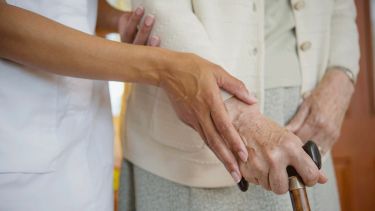- Unpaid carers twice as likely to have used foodbanks during pandemic.
- Over 200,000 unpaid carers had someone in the household go hungry during lockdown.
- 106,000 adults in the UK currently caring for someone outside of their household who is older, disabled or seriously ill, have used a food bank.
The ESRC-funded Sustainable Care: connecting people and systems research programme explores how care arrangements, currently ‘in crisis’ in parts of the UK, can be made sustainable and deliver wellbeing outcomes. It aims to support policy and practice actors and scholars to conceptualise sustainability in care as an issue of rights, values, ethics and justice, as well as of resource distribution.
Researchers used data from two waves of Understanding Society: the 2017-2019 wave and the April 2020 COVID-19 wave, which covers the socio-economic and health consequences of the COVID-19 pandemic and will be repeated monthly.
The report is the first in a series relating to unpaid carers’ experiences during the COVID-19 pandemic, which can be found as part of the Sustainable Care team’s Care Matters series.
The report looked at use of foodbanks and experience of hunger in the households of unpaid carers providing care to someone living outside their own household in April 2020, during the full ‘lockdown’ stage of the official UK Government response to the COVID-19 pandemic. It also reports evidence of changes in their mental wellbeing, analysing these by sex, age and employment status.
There were an estimated 6,048,286 adults providing care to someone living outside their own household in the UK in 2020. These carers are an important ‘subset’ of all adult unpaid carers, estimated to number 10,991,440 people.
The data analysis shows that 106,000 adults in the UK currently caring for someone outside of their household who is older, disabled or seriously ill, have used a foodbank. Among this group of unpaid carers, almost 229,000 have had someone in their household go hungry during lockdown. Younger carers were more likely to live in a household with someone who experienced hunger; 55,153 (12.2%) of those aged 17-30, compared with 9,294 (0.7%) carers aged 66 or older.
Professor Sue Yeandle, Principal Investigator of the Sustainable Care programme, said: “Our new study’s findings should worry us all. COVID-19 has brought huge changes that underscore the need for a step-change in support for carers. That in April 2020, people in so many carers’ households went hungry and needed to use a food bank to have enough to eat must surely shock the nation. Our findings call for urgent Government action to help carers struggling to cope. It cannot be right that carers are hidden from view, with declining mental wellbeing, or face hunger and food poverty as they care for those among us who need support.”
Helen Walker is Chief Executive of Carers UK, a partner in the Sustainable Care programme, said: “This pandemic is pushing unpaid carers to breaking point physically and mentally. The fact that carers are also twice as likely as the average person to be relying on foodbanks demonstrates just how difficult life is for them right now. It is simply unacceptable that carers are having to go hungry because they do not have support.
“Surely, when the majority of carers are providing even more care for relatives during this pandemic, and spending more to do so, they deserve some help? The Government must acknowledge the impact the pandemic is having on carers’ finances and job prospects and raise Carer’s Allowance as a matter of urgency.”
Carers UK have stated that:
Carer’s Allowance is the benefit for people caring for 35 hours or more each week and is just £67.25 a week. While many costs have been relaxed for various groups of people, carers and their families remain under extraordinary pressure. Carers UK wants to see the benefit raised and is also urging the Government to provide a one-off coronavirus Supplement of £20 a week to those entitled to Carer’s Allowance - to match the rise it has made for those receiving Universal Credit to meet extra costs during the pandemic.
Carers UK is further emphasising the need for the Government to continue to bring forward schemes that identify carers and help them access food more easily where they have a clear need.

